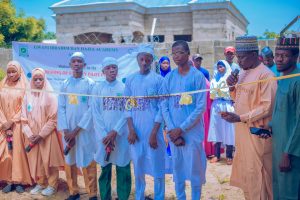
In a major stride towards sustainable agriculture in Northern Nigeria, students and teachers of Gwani Ibrahim Dan Hajja Academy in Jama’are, Bauchi State, have unveiled an innovative solar-drying project aimed at tackling the region’s high rate of postharvest losses.
The initiative, tagged “SunDry,” was officially commissioned on Tuesday, September 30, 2025, and is designed to reduce the estimated 46 percent postharvest losses suffered by smallholder farmers in the area. The clean-energy technology is expected to modernize the drying of perishable crops such as tomatoes, onions, and peppers—key produce for thousands of rural farmers.
Speaking at the commissioning ceremony, Alhaji Sunusi Abubakar, who represented the Executive Chairman of Jama’are Local Government, described the project as a “game-changer” for local farmers and the community at large.
“This initiative goes beyond mere innovation; it is about economic empowerment,” Abubakar said. “By providing a viable solution to postharvest waste, we are directly putting more money into the pockets of our hardworking farmers and strengthening our local agricultural value chain.”
The Academy-developed solar dryer uses renewable solar energy to create a controlled and hygienic drying environment, offering a faster and cleaner alternative to traditional open-air drying methods that expose farm produce to contamination, pests, and unpredictable weather conditions.
According to Malam Abdulmalik Sadisu, the project’s principal lead, the innovation reflects the Academy’s commitment to sustainable development and practical learning.
“In an era of climate change and food security concerns, this project represents our commitment to practical, sustainable solutions,” he said. “We are not just teaching students; we are empowering them to be problem-solvers. These four pilot dryers, generously funded by the Zayed Sustainability Prize, will serve as a live laboratory to optimize the technology for wider adoption across Bauchi State and beyond. Our ultimate goal is to make the 46 percent loss a thing of the past.”
The launch marks the beginning of the project’s operational phase, which will include community engagement, farmer training, and data collection to evaluate its impact on reducing crop losses and improving market value.
Experts say the initiative could significantly transform local agriculture by improving crop preservation, reducing waste, and boosting farmers’ incomes—while also positioning Jama’are as a hub for green agricultural innovation in Northern Nigeria.
Gwani Ibrahim Dan Hajja Academy is an educational institution committed to fostering innovation and community development. The Academy integrates real-world, community-driven projects into its learning system, focusing on scalable, low-cost solutions to address Nigeria’s pressing socio-economic challenges.





